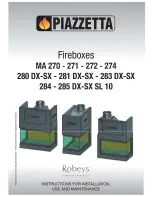
6.3.3
Control the burn process
Control the burn process with the control lever. This lever controls the amount of primary
combustion air and both the secondary combustion air and airwash amount.
Control lever in the far right position:
primary air inlet maximum open
secondary air inlet maximum open
airwash inlet maximum open
Control lever in the center position:
primary air inlet is closed
secondary air inlet maximum open
airwash inlet maximum open
Control lever in the far left position:
primary air inlet is closed
secondary air inlet is closed
airwash inlet is closed
Warning:
Setting the control lever in the far left position (all air inlets closed) when the
fuel is burning leads to excessive emission of hazardous gasses (example:
carbon monoxide) and soot deposit on the glass of the door and in the
chimney. Never close the air inlets when the fuel is burning. Always keep the
secondary air inlet and air wash inlet open by setting the control lever
somewhere in-between the center position and the far left position.
Caution:
Continuous firing with the primary air inlet fully open (control lever in the far
right position) causes a white-hot fire that can damage the appliance. Use the
primary air only during the first fuel load and for ignition of a new fuel load.
Operation
Box 20 45
21












































